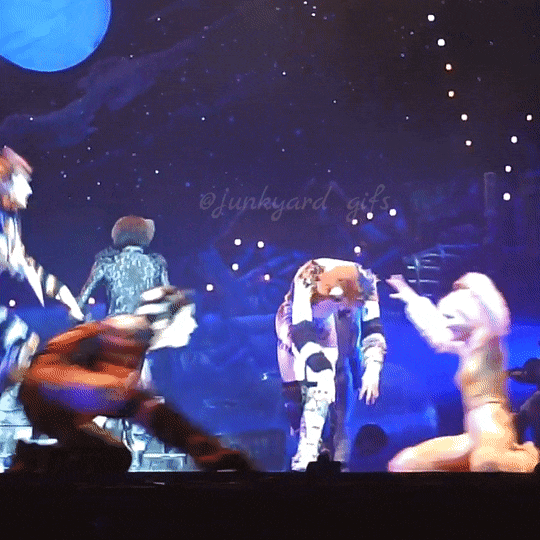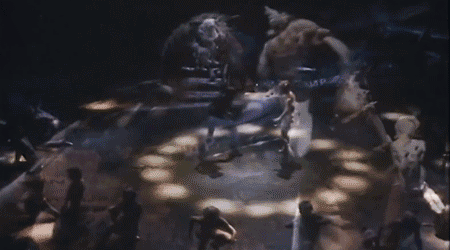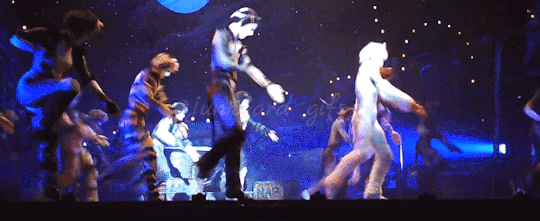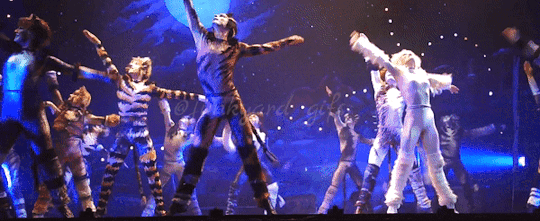#performance history
Explore tagged Tumblr posts
Text
hey
psssst
remember when 👀
youtube
oh hell yeah, London-scored Mungojerrie and Rumpelteazer!
Shiki production, Nagoya leg, 20 July 2000, with Shinobu Aikawa as Rumpelteazer and Hitoshi Tsuji as Mungojerrie.
(At the end, leading into 'Old Deuteronomy', it's Sillabub who has the line equivalent to 'I believe it is Old Deuteronomy', and Skimbleshanks next to her near the camera. Skimble rather than Misto goes to fetch Deuteronomy.)
#videos#s: mungojerrie and rumpelteazer#c: mungojerrie#c: rumpelteazer#mungojerriexrumpelteazer#shiki#2000 shiki#shinobu aikawa#hitoshi tsuji#performance history
24 notes
·
View notes
Text
Just saw someone on here say the Baz Luhrmann Romeo & Juliet is “considered the most faithful movie version of Romeo and Juliet” and had to stop myself from chasing them down the internet like the meme goose going “BY WHO?! BY WHO!?????” Don’t start internet beef over this, self! They didn’t say THEY liked it best! They might be an innocent bystander! Also you are weirdly aggressive about Shakespeare!
Okay, deep breath, short post. Short post! We can do this!
Romeo and Juliet has an oddly small cinematic footprint, compared to its cultural impact. That’s probably why Luhrmann’s version can still hold any primacy. (Gods, are there English teachers showing this in class? Because they don’t have to fast-forward through the Zefferelli nudity? What a thought. Stay on target.) I can only theorize that other Shakespeare plays get more adaptations because they’re centered on a huge male role, so they can be a Serious Showpiece for a single male actor. R&J doesn’t operate that way.
And in my experience (having seen four or five live productions, off the top of my head) it’s a play that really lives in the theater. Stupid as it sounds, every time I see Romeo and Juliet live, some part of me feels like this time, it might end happy. The letter might not go astray: the messenger won’t get caught in a quarantine, Romeo will know Juliet isn’t dead, and everything will turn out fine. It’s so often noted that the play isn’t structured as a tragedy, but as a New Comedy (like Midsummer Night’s Dream, et c. — a story about young people defying their parents for love) that goes wrong: somehow this works on me, in person, such that I really think maybe we’ll pull it off! The kids will be all right, the parents will be chastened, and all will end well. It breaks my heart, every time, when it doesn’t.
I have small quibbles with the Luhrmann R&J, but I won’t enumerate them here. I simply want to point out that Luhrmann makes the most appalling directorial choice he possibly could. And he’s not the only one! This choice was in vogue during the 19th century in England (which is also when Bowdler took the naughty bits out of Shakespeare, so…yeah. Not very concerned with being faithful to the text.) Luhrmann, and the rest of the 19th century text-criminals, have Juliet wake up while Romeo is still dying.
I suppose some of you are now going, “why is that such a terrible thing? It allows for more acting!” Well, yeah, that’s why the hams of the London stage liked to do it in Romantic and Victorian times. Everything for more melodrama!
But it’s a sin against the text, and I’ll tell you why. That breathless stupid hope I talked about above, that the entire play’s structure induces? The hope that everything will turn out right? It builds up in you like a flood, and everything goes wrong again, and the entire weight of your hope is penned up in your heart, and they came so close! It was so close to being all right, but Romeo kills himself, and nothing will be all right.
And Juliet wakes up, still a citizen of the Country of Hope where this trick is so clever and Romeo’s going to save her, and she finds him there. And nothing makes sense to her. He was supposed to be here, but he was supposed to be alive. It’s a cruel inversion of her hopes, it’s her love made Death at last, it’s her whole world collapsing. We know how close it came to being all right, but she doesn’t know. She despairs. She sees he poisoned himself. And then she kisses him. And she says,
“Thy lips are warm.”
Now she knows as clearly as we do how nearly they were together, how close they came to a happy ending. Total understanding crashes over her, and crashes out of us. It’s the perfectly weighted moment of catharsis for the entire play. No lie: just typing her words above, I started crying with no warning. It’s the sharpened point of the play in Juliet’s heart, and ours. Those four words are the most devastating, understated thing. They are the cold, uncaring touch of Death.
And if she saw him die, they don’t work. They make no sense. She sounds like a fool saying them. And the whole weight of the play lands wrong, because some director thought he knew better than William Shakespeare how to wring the salt tears from human hearts.
#Shakespeare nerd#favorite play#Romeo and Juliet#performance history#fuck bowdler#fuck the Victorians#failed happy ending#fuck baz luhrmann#responding over here#theater#william shakespeare#Shakespeare#i have too many opinions#i have studied this intensely#close reading#catharsis#drama#in my feels
6 notes
·
View notes
Text

HOT!
#drag queens#drag race#drag performer#drag queen#drag#drag king#le filip#trans community#queer#drag artist#lgbtqia#lgbtq#lgbtq community#lgbtq artist#lgbtq people#lgbtq positivity#lgbtqia+#lgbtqplus#lgbt nsft#lgbt pride#lgbtq history#queer pride#lgbtlove#transfem#transgender#transgirl#lgbt
1K notes
·
View notes
Text
The Zaouli dance: A mesmerizing blend of rhythm, tradition, and artistry. More than a performance, it’s a cultural heartbeat of the Guro people of Côte d’Ivoire. 🌍✨
#africa#african traditions#african dance#black people#black culture#african culture#african tribe#black history#blacklivesmatter#music#tribal dance#dancing#black is beautiful#black excellence#dance#The Zaouli dance: A mesmerizing blend of rhythm#tradition#and artistry. More than a performance#it’s a cultural heartbeat of the Guro people of Côte d’Ivoire. 🌍✨#Reposted: @josh.animals#panafrikan#blacktraveljourney#africanhistory#blacktravel#everydayafrica#africancreatives#representationmatters#Moyoafrika#reminds me of tap dancing#black lives matter
1K notes
·
View notes
Text

saint sebastian tended by saint irene but they're both drag artists
felt like this might be something this site would enjoy
on stage: oleandro & delfi oraakel, photographer: peroksiid (on ig as oleandro_drag, delfi_oraakel and peroksiid)
#saint sebastian#st sebastian#drag#drag king#drag queen#saint irene#saint sebastian tended by saint irene#art#drag artist#religious art#queer#art history#homoerotic art#drag performer#queer art#trans#transgender#transmasc#saints#gay#gay art#trans art#lgbt art#christianity#catholic art#progressive christianity#queer christian#<- i'm currently too complicated abt god to have a label other than agnostic But i love yall and feel like you might appreciate this so. ta
3K notes
·
View notes
Text
Mix Sahaphap gets to perform (and has the performance chops to perform) in a style that I’ve never seen any other male actor get to embody. Mix gets to unironically play the #strongfemalecharacter. The Beatrice, the Elizabeth Bennett, the Jo March. Strong-willed, emotional, kind-hearted.
Not only do the plot points line up, but Mix, more than any BL actor I’ve seen, fully leans into the embodiment of this archetype. In his roles, he rolls his eyes, pouts, banters flirtatiously, softens his posture and expression at small details. He doesn’t over-exaggerate and imposition other characters but his face also doesn’t hold back his character’s thoughts and judgments. And when the moments arrive, he lets all the hurt and anguish pour out in shatters of tears and visible heartbreak—the star-counting scene, anyone????—in a way that harkens to the operatic emotionality of well-done melodramas, soap-operas, and their contemporary Thai equivalent of Lakorn. It’s only that these have never been men’s roles in those.

It’s no surprise that one of Mix’s roles—Cupid’s Last Wish—is explicitly a gender body-swap, and Tian in A Tale of Thousand Stars is (albeit explicitly denied within the show) heavily connected to gender body-swapping. What Mix specializes in as an actor, and does exceptionally well, has been defined as feminine. To depict a kind of queer expression in this style is novel because it’s not camp, it’s not okama, it’s not a soft or femboy, it’s not a BL twink (Mix has been mostly excluded from the schoolyards and quads of the BL universe except for a role as a senior crush in Fish Upon the Sky). It’s too sincere and too adult for any of that.

In Moonlight Chicken we get to see, without the pretense of gendered mysticism, this performance style’s seduction, warmth, wit, and explosiveness within the framework of a general gay form of expression. It says that this kind of femininity might just be a gay thing. Not all gay men exhibit it, obviously—queer men aren’t a monolith. Still, it gives us something to consider about how we observe performance of queerness on screen, especially in front of an audience that puts so much more emphasis on ships, heat, and pairing chemistry to assess how well they perform a BL role. Could we look for other features to judge performance of queerness instead of how well they kiss?
Seme and uke roles would be the major performance style categories loyal BL fans assess actors with, yet even within the archetype his character’s fill within BL narratives, Mix’s performances differ from the typical uke depiction in BL because he really doesn’t perform them as passive. Rather, Mix’s characters and his portrayal of them are dynamic and demanding. It certainly fits certain stereotypes of ukes (Gilbert!) and their gay stereotype equivalent of bottoms as pillow princesses and brats. Mix’s characters, though, have more drive, agency, and compassion than that, and he plays them with all of those currents running underneath.

We certainly have openly gay writer/director Aof Noppharnach to thank for writing this kind of queer character for Mix to play in Tian and Wen. But for Mix’s specific commitment to the performance starting off with his (debut!?) role in ATOTS, we first have Earth to thank for believing in Mix’s ability and recommending him to portray the role of Tian, and then Aof’s acceptance despite his differing initial expectations for the character. Mix, Earth, and Aof have all been open about how Mix in his personal life and nature holds a lot of similarities to both his role as Tian in ATOTS and Wen in Moonlight Chicken. Some people might knock points off his performances because he’s like them. But his relationship to the characters, rather than dampening my enthusiasm for Mix’s performances, helps me appreciate his willingness to give an authentic performance in a style that hasn’t been encouraged on screens previously. It’s made more impactful that he chose to risk vulnerability to bring something personal that had previously been excluded from screens because of its gender deviance (and in broader society explicitly condemned). This doesn’t make a claim on Mix’s actual identity, but simply shows his willingness to understand and perform the expressions of his queer characters with an effort at empathy that many other actors would feel challenged to bring.
Some actors are chameleons, but some actors have a gift of a type within which they can explore depths and range that no one else can best. For me, that’s what Mix does in his work when directors and casting understands his talent. There’s a BTS video of Mix actually fainting during a scene while in Earth/Phupa’s embrace on the mountain that immediately brought to mind the wildly famous final scene in the film Camille where Greta Garbo as Marguerite dies in her lover’s arms.

For Mix, it was a serious incident due to regrettably extreme conditions and requiring the on-set paramedics, but these levels of theatrics, for me, are emblematic of what Mix is capable of as a performer, as well. After all, he had to faint in Phupa’s arms multiple times on purpose. It’s the kinds of Old Hollywood and heightened sentimental romance realms Mix takes his performances to! Then he can turn around and make it look easy to take that same character into grounded quips or dedicated everyday tasks. It only takes writers, directors, and audiences willing to see that men can feel this way and act this way. Mix has paved the way.

#mix sahaphap#earthmix#atots#moonlight chicken#cupid’s last wish#mlc#ossan’s love th#futs#fish upon the sky#ofts#Thai bl#queer history#queer performance#there’s a reason Mix can walk into the last five second of only friends and make such an impact#again I’m soglad to see more exploration of different queer embodiments in bls#but mix specifically changed my life#moonlight chicken was my second series after only friends#and I had just never seen a gay character in any media get to act like that with such earnestness#it was the first time I felt like I saw myself on screen#the jungle the series
815 notes
·
View notes
Text
Roberta Flack & Michael Jackson performing "When We Grow Up" on the Free to Be...You and Me children's TV special (1974).
#roberta flack#michael jackson#when i grow up#1974#free to be...you and me#music#tv special#icons#legends#r&b#performance#african american#black history#black music#king of pop#black people#black culture#1970s#70s#rare#r.i.p.#video#sbrown82
314 notes
·
View notes
Text

Mick Jagger getting his makeup done before a performance, 1973 ♡ Photographed by Tommy Mardell
#mick jagger#the rolling stones#rolling stones#makeup#style#music#music performance#1973#70s#1970s#photography#rock photography#music photography#aesthetic#fashion#vintage#rock n roll#rock#rock music#70s music#70s aesthetic#70s style#70s fashion#1970s fashion#1970s music#1970s history#history#music history#vintage photos#vintage photography
419 notes
·
View notes
Text
Kendrick Lamar - Not Like Us (Super Bowl Performance) • February 9, 2025 - New Orleans, LA
#kendrick lamar#not like us#Drake#pg lang#west coast#Kendrick Lamar live#SZA#Serena Williams#crips#bloods#choreography#Super Bowl#Super Bowl 59#kansas city chiefs#philadelphia eagles#nfl#black history month#black history#rap#rappers#hip hop#samuel l jackson#live performance#music#rap 2025#hip hop 2025
288 notes
·
View notes
Text
I wasn’t going to say anything, but seeing people get chastised over saying “Rest in Peace” for Michelle Trachtenberg instead of using the Hebrew phrase? Yeah, I need to.
My great-grandfather was Jewish. He married a Catholic woman who loved him, and instead of erasing his traditions, she embraced them. She honored both Jewish and Catholic holidays. She handmade decorations for both. We still have them. We still carry that love, even if we aren’t practicing. Because being Jewish isn’t just about practice—it’s about family, history, and remembrance.
And that’s why this whole discourse hurts.
Most people saying “Rest in Peace” aren’t trying to erase Jewish mourning traditions. They aren’t trying to be disrespectful. They’re just expressing love in the only way they know how. And instead of taking a moment to teach, to connect, to build bridges—some of you would rather tear people down for not already knowing.
But here’s the thing: Judaism has survived through remembering. Through teaching. Through welcoming people in rather than shutting them out. My family held onto our Jewishness through love, not through pushing people away. Maybe—just maybe—that’s something to think about before deciding that someone’s sympathy isn’t “correct” enough.
Because in the end? What matters isn’t the exact words used. It’s that she is remembered. And that people care. 💙
#michelle trachtenberg#judaism#jewish#jumblr#culture#jewish mourning#rest in peace#zichronah Livracha#grief#respect#jewish history#jewish heritage#jewish tumblr#jewish identity#jewish remembrance#jewish solidarity#discourse#callout culture#internet culture#tumblr discourse#activism vs performative activism#let people grieve
211 notes
·
View notes
Text

An Audience in Athens during the Representation of Agamemnon by Aeschylus — by William Blake Richmond
#william blake richmond#art#classical antiquity#ancient greece#ancient greek#athens#audience#play#the oresteia#aeschylus#greek tragedy#theatre#agamemnon#history#stage#throne#priest#dionysus#performance#tragedies#tradegy#europe#european#architecture
260 notes
·
View notes
Text

Remember how Coricopat was Victoria's original pas de deux partner?

(London 1981)
Here they are, more than 40 years later, leading the ball together!


Marisa Paull Gorst in her debut as Victoria and Wilson Brady Livingston as Coricopat. US tour 6, October 2022.
#2022 us tour#cats the musical#marisa paull gorst#wilson brady livingston#coricotoria#coricopat#victoria cats#coricopatxvictoria#performance history#s: jellicle ball#ss: pop ups#c: victoria#c: coricopat#221015
23 notes
·
View notes
Text





❝ I wish I was home, I wish I was back there with the things I've been knowing... ❞
Diana Ross as Dorothy Gale The Wiz ( 1978 ) dir. Sidney Lumet
#diana ross#dorothy gale#the wizard of oz#the wiz#musical#musicals#musicalgifs#musicaledit#filmtvcentral#filmandtv#userstream#dailyflicks#usersource#cinemapix#tvedit#70sedit#filmtvdaily#cinematv#userbbelcher#femaledaily#dailywomen#filmedit#70sdaily#celebedit#do yourself a favor and watch the wiz today#or at least listen to this song#one of the most beautiful performances in musical history#and idgaf if she was 30yo playing a teenager i actually think it works better that way
281 notes
·
View notes
Text




This is Amadeo, he's 20 years here. He was rescued from a brothel when he was 15, named named Arun then, I think. I cannot be sure. The abuse in the brothel was such that he cannot be sure that's what his parents named him. Arun. The parents that sent him to work on a merchant boat in Delhi when in actuality they had sold him into slavery to the ship's captain. All fragments. Shackled on the boat. The brothel. My maker's purchase. His renaming me. His reluctance to share the Dark Gift, knowing what it would do to his beloved Amadeo. I served him with all my heart. Basked in his mercy, his worshipful mercy.
Interview With The Vampire – 2.04: I Want You More Than Anything in the World
#interview with the vampire#cinematv#filmtvcentral#userthing#smallscreensource#dailyflicks#userstream#tvarchive#filmtvtoday#usersource#chewieblog#tvedit#assad zaman#goddd this whole speech was so harrowing and assad delivered it wonderfully#give this man his flowers his performance this season has been incredible#am i my history i have endured -> fuck what a line i need a moment
414 notes
·
View notes
Text
What the fuck is this?

Guess Google decided they want a boycott.
#It's not like I didn't know it was all performative#But to be this blatant about it#Make this years celebrations be for the books#pride month#black history#womens rights#pride#lesbian#gay#bisexual#transgender#queer#intersex#asexual#acespec#aroace#arospec#trans#lgbtq+#lgbtqia#lgbt pride#lesbian pride#blm movement#blacklivesmatter#fuck trump#fuck elon musk#donald trump#elon musk#google
285 notes
·
View notes
Text



I was going through some old papers at my dad's house today and found this shitpost of a school assignment I was apparently given in 4th grade
#the nostalgebraist family household#iirc this was pretty typical of my 4th grade teacher#she prided herself on being a stickler#having and consistently applying high standards etc.#but the “high standards” always involved the elaborate made-up rulesets of stuff like... this#just this endless deluge of bizarre and educationally ill-motivated U.S. history/civics-related busywork#i did not enjoy this at the time and its purpose is even more mysterious now#since i lack even the recourse of “oh maybe this all makes sense to Adults somehow”#maybe she saw herself as... training a new generation of high-performance pencil-pushing civil servants? idk
124 notes
·
View notes